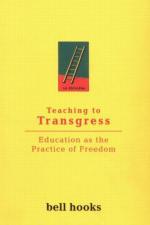
|
| Name: _________________________ | Period: ___________________ |
This test consists of 15 multiple choice questions and 5 short answer questions.
Multiple Choice Questions
1. Hooks said who must be happy in order for education to be most effective?
(a) Teacher ONLY.
(b) Teacher and students.
(c) Administration, teachers, and students.
(d) Students ONLY.
2. What Latina theorist did Hooks introduce in Chapter 5?
(a) Karen Rodriguez.
(b) Chita Rivera..
(c) Chela Sandoval.
(d) Cha Cha Ramirez.
3. Which of the following did Hooks say is a feminist statement?
(a) She is not sure if she is intelligent enough to pursue career efforts.
(b) Her husband sourced and encouraged his wife to pursue career efforts.
(c) Her husband supported her inherent career efforts.
(d) Her husband will not allow her to pursue career efforts.
4. According to Hooks, when is the profession of teaching best served?
(a) When a teacher does so with the idea that he/she is nurturing free adults.
(b) When all students understand what is being taught.
(c) When the parents of the students compliment the teacher's progress.
(d) When a teacher receives an award or promotion for a job well done.
5. What type of person did Hooks say would most likely recognize how significant her work is?
(a) Women who are greatly involved in higher education.
(b) Men whose highest level of education is high school.
(c) Men who are greatly involved in higher education.
(d) Women whose highest level of education is high school.
6. In Chapter 4, what important tenet did Hooks repeat?
(a) This is about education for liberation.
(b) This is not about knowledge for freedom.
(c) This is about knowledge for freedom.
(d) This is not about education for liberation.
7. How did Hooks compare the characteristics of middle and upper class women to men of the same class?
(a) They are exactly the same.
(b) They are different but equal.
(c) They are NOT the same.
(d) They have similarities but are not exactly the same.
8. How did Hooks say her work is often received by its readers?
(a) It is well liked.
(b) It is ignored.
(c) It is incorporated into the text of many classes.
(d) It is criticized.
9. At the end of Chapter 3, what school did Hooks mention?
(a) University of Massachusetts.
(b) Northwestern University.
(c) Columbia University.
(d) Oberlin College.
10. What did Hooks say about male colleagues' lack of interest or unwillingness to listen to his female counterparts?
(a) It's painful for women.
(b) It's painful for men and women.
(c) It's NOT painful for men or women.
(d) It's painful for men.
11. What need/expectation did Hooks say is common in poorer women?
(a) To have children.
(b) To obtain a post-secondary school degree.
(c) To earn money.
(d) To get married.
12. What did Hooks say is not necessarily found in all social classes?
(a) Dreams.
(b) Love.
(c) Assumptions.
(d) Wealth.
13. What did the theorist mentioned in Chapter 7 say about himself?
(a) He did what he could but what he could was absolutely limited by his own maleness.
(b) She did what she could but what she could was absolutely limited by her own femaleness.
(c) His ideas are superior to those of his female counterparts.
(d) Her ideas are superior to those of his male counterparts.
14. According to Hooks, what is the great road of progress for poor men and women with regard to employment?
(a) When they don't make a lot of money.
(b) When they are able to avoid the work they enjoy.
(c) When they are able to do the work they enjoy.
(d) When they make a lot of money.
15. What did Hooks believe about the best instructional teaching methods?
(a) They encourage students' involvement.
(b) All instructional teaching methods are created equal. There is no such thing as the "best instructional teaching methods."
(c) These methods are inherent and cannot be taught to teachers.
(d) They discourage students' involvement.
Short Answer Questions
1. In Chapter 1, what did Hooks say with regard to all-black schools and the education process?
2. Which school year reunion did Hooks mention in Chapter 2?
3. Chapter 6 said that Hooks' works include the framework that consists of analysis that is what?
4. Hooks said that sometimes oppression is the result of the need to find better ways of aligning what?
5. Who does Hooks believe is in charge of constituting what is considered good theory?
|
This section contains 728 words (approx. 3 pages at 300 words per page) |

|




